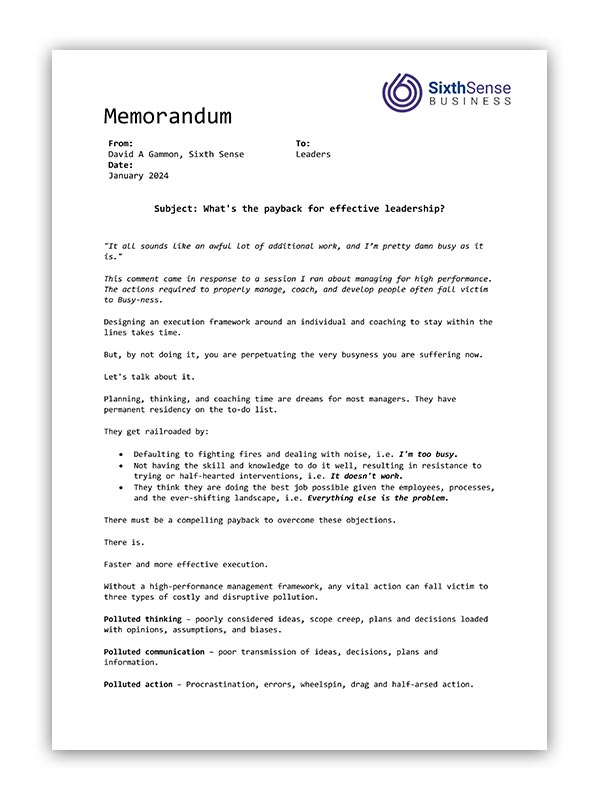From:
David A Gammon, Sixth Sense
To:
Leaders
Date:
January, 2023
What’s the payback for effective leadership?
“It all sounds like an awful lot of additional work, and I’m pretty damn busy as it is.”
This comment came in response to a session I ran about managing for high performance.
The actions required to properly manage, coach, and develop people often fall victim to Busy-ness.
Designing an execution framework around an individual and coaching to stay within the lines takes time.
But, by not doing it, you are perpetuating the very busyness you are suffering now. Let’s talk about it.
Planning, thinking, and coaching time are dreams for most managers. They have permanent residency on the to-do list.
They get railroaded by:
- Defaulting to fighting fires and dealing with noise, i.e. I’m too busy.
- Not having the skill and knowledge to do it well, resulting in resistance to trying or half-hearted interventions, i.e. It doesn’t work.
- They think they are doing the best job possible given the employees, processes, and the ever-shifting landscape, i.e. Everything else is the problem.
There must be a compelling payback to overcome these objections.
There is: Faster and more effective execution.
Without a high-performance management framework, any vital action can fall victim to three types of costly and disruptive pollution.
Polluted thinking – poorly considered ideas, scope creep, plans and decisions loaded with opinions, assumptions, and biases.
Polluted communication – poor transmission of ideas, decisions, plans and information.
Polluted action – Procrastination, errors, wheelspin, drag and half-arsed action.
This pollution disrupts clean and effective action. It leaves Leaders chasing their tails, deadlines slipping, firefighting, defensive, blame-seeking and excuse-making.
Yet a simple shift in management input to the front of a project/task avoids all this. It’s all in the set-up. It’s the woodcutter’s rule. Measure twice and cut once.
As a manager, a good start is ensuring that your delegation routine includes the following five things.
- Clear articulation of the outcome (what you want to happen and what it is you don’t want to happen).
- Assessment of the resources, skills and capabilities to support completing the task.
- Description of action steps to the required level of detail.
- Identify and plan for potential/actual obstacles to completion.
- Define how progress and success will be communicated and measured.
These steps underwrite the successful completion of the action and give your team a framework to self-manage their performance.
Do you still think you don’t have time?

